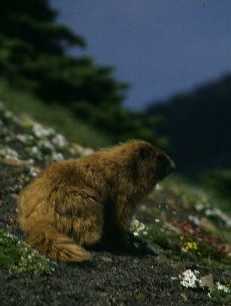 Weasels, genes, culture and
the mercurial role of instinct
Weasels, genes, culture and
the mercurial role of instinct
reveals about life on earth.
background | seven related findings | essay | argument | dialectical approach | conclusion
Dillard instinctual living – reason and “passion”
Humans are “not alone
in the capacity to pass along non-genetic information–culture”
{68
chapter iv. The Dominant Animal
genome
genotype
phenotype
heredity
acquired traits (soft inheritance) genetic (hard inheritance)
nurture nature
learned behavior instinct
“practiced” “hard wired”
Essay due
“How do we describe nature?
and
What do I owe the world and nature?”
1.
Dillard, Carson, and Wilson on
what we “owe” one another.
2.
Ehrlich & Wilson &
Diamond – on the enduring complexity of nature.
Argument
Humans are organisms and are the products of
inheritance, behavior, and culture (nature & nurture)
"When organisms evolve, they also change the environments of other organisms."
"Changing environments change organisms; changing organisms in turn change environments: that's pretty much the central story of life on earth."
"inability to evolve in the face of environmental change."
p. 20, Ehrlich Chapter One.
background | seven related findings | essay | argument | dialectical approach | conclusion
Seven points in Ehrlich
& Ehrlich
Language
and tools
Development
of culture and early humans
Brain
evolution (changes in the central nervous system over time)
Mirror
neurons: learning & empathic responses
Volume
of blood needed for neuromuscular control
Eight
qualities of the human brain
Consciousness
and the “unconscious” or instinctive – impulsive character
Sympathetic
tension in relations between genes & culture–human are dualistic
background | seven related findings | essay | argument | dialectical approach | conclusion
The
dialectical means of examining the world is a basic concept:
Thesis + antithesis = synthesis
Thesis:
We are determined by our
genes.
Antithesis:
No,
we are more influenced by our culture.
Synthesis:
Together humans are enriched by both genes and culture working in tandem.

“In summary, as we learn more about the human
genome, the notion of ‘genes
for behavior’ must be discounted. For example traits such as normal
behaviors
few cases have been
found of a specific gene or even many genes that greatly
influence variation in the trait. It is becoming clear that when genes
influence
traits, and this applies especially to behaviors, they will do so in a way
that is
strongly mediated by the environment.”
“Environmental circumstances during any phase of life may alter
the way in
which an individual’s genes function at that time and later.”
The
case of the disappearing frogs.
Frog
eggs are deposited in water.
In
the tadpole (larval) stages free swimming young feed on organisms in the water.
As
the initial place of origin whatever nutrients and chemicals are dissolved in the water
affect
Today, worldwide there is deterioration in frog populations.
The causes of these declines are not certain, but there is indication that a fungus is inhibiting (a form of predation) the survival of frogs.
Effects of Chytrid fungus and parasitic flies on frogs.
The Dominant Animal on the web
The Imperiled Planet | The Dominant Animal | Storm Over the Amazon | The Tragedy of the Commons | The Web of Life
